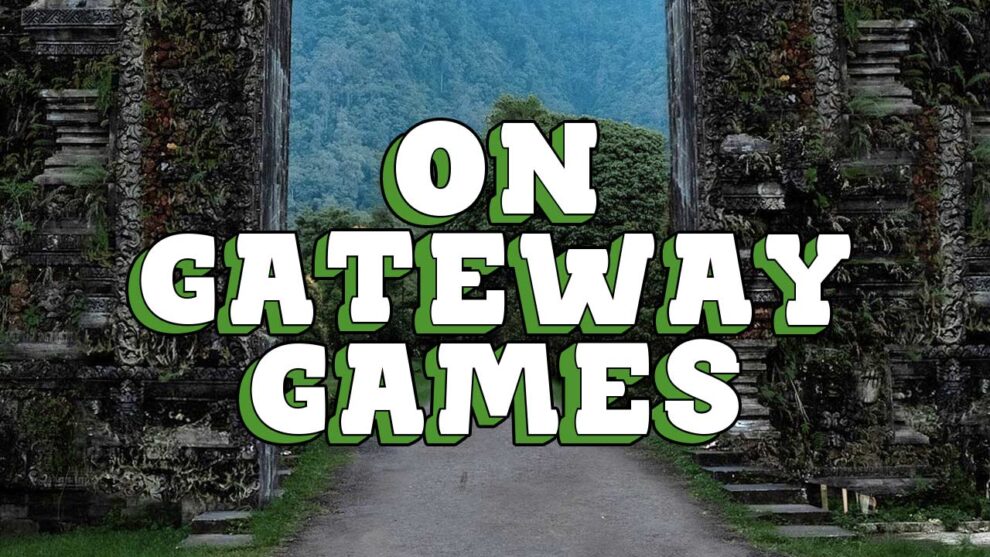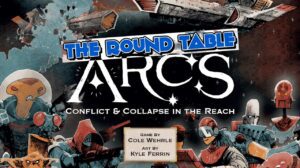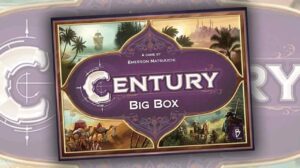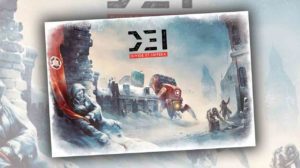
Thomas Wells
What was your introduction to modern board games?
I grew up in rural Wyoming, so my access to gaming was filtered through my dad, who grew up playing games. I was dropped into Avalon Hill wargames by him when I was about 9 (which was not the most optimal experience–what 9-year-old relates to Afrika Korps?)
Then, later on, I found a group of fellow dorks in high school, and we went in on a web order of Twilight Imperium 3rd Edition. We spent many weekends lasering and war-sunning each other into oblivion. For a long time, I thought that conflict-heavy games were the only types of games there were. There was no FLGS for me growing up, so BoardGameGeek became my portal to a mythical land of cardboard and bits.
What are your feelings on gateway games?
Board gaming has been a very lovely experience for me, and I enjoy games all across the spectrum. As a rabid fan and lover of games, I remind myself often that some people are just not interested in moving through the gateway to more complex stuff. With that in mind, I’ve never had a bad experience introducing someone to a Knizia game. High Society, Lost Cities, The Quest for El Dorado—all of these are simple, with lots of room to interact, have a great time, and make you feel like a real smarty-pants. I’ve found that most people, once they’ve been bitten by the bug, are able to find what they like on their own.
![]()
Will Hare
What was your introduction to modern board games?
My friends and I stumbled upon an old website where you could play Dominion online, called Isotropic. That eventually encouraged us to get a physical copy of the game. When another friend of ours heard we were getting into board games, he recommended Arkham Horror. Jumping from Dominion to Arkham Horror was quite the bold leap! We took a step back after that and spent some time with Kingsburg and Ticket to Ride: Europe instead, which really let us get our footing before venturing into more complicated games.
What are your feelings on gateway games?
I think the usual games you hear recommended for gateway games might be too narrow. I’ve actually found the most success in introducing people to the idea of board games by using social deduction games. Coup, The Resistance, One Night Ultimate Werewolf, or even just classic parlor mafia/werewolf always are big hits. Usually, once someone has gotten a taste of the excitement in those types of games, it’s easy to convince them to be open to other types of new gaming experiences as well.

Tyler Williams
What was your introduction to modern board games?
My first really tabletop game was Twilight Imperium 3rd edition. I jumped off the deep end and never looked back.
What are your feelings on gateway games?
I think there is a difference between gateway games and party games. Gateway games, to me, are games of any specific type of genre that showcase or teach a general board game theme, such as deck building or worker placement, in a way that is simple without any twists. I think back to Survive: Space Attack! or King of Tokyo as good examples of this. I believe that these games are valuable and important to helping ease people into deeper games without them feeling overwhelmed or out of their depth. Just like you practice a little bit before you hit the black diamond when skiing, it is important to help prepare people so that they can enjoy and love the hobby as much as you do.
Andrew Holmes
What was your introduction to modern board games?
I always played the classics (Scrabble, Monopoly, Risk etc) but my first ‘modern’ board game was Hare and Tortoise, a fantastic little race game. However it wasn’t until a couple of years later when I was introduced to Carcassonne that I actually realised that the world of modern board games existed. Carcassonne led to me finding out about its expansions which led to discovering other modern board games.
What are your feelings on gateway games?
I think the hobby owes its current level of success almost entirely to gateway games bringing in new people. Very few people do what Tyler or Thomas did and leap straight into Twilight Imperium or Afrika Korps—most of us are hooked by gateway games and explore the hobby from there.
Personally I love gateway games – when balancing babies and board games time is always limited, I’m frequently exhausted and I’m normally the person who learns and teaches new games in my groups. Don’t get me wrong, I still love heavier games but at the moment it’s quicker and less rules intensive gateway games that fit my life as a tired parent better.
Gateway games also work harder, they have to be good for those already in the hobby and work for those who haven’t yet discovered the joys of board games. A good gateway game is better than a good non-gateway game.
And, of course, Carcassonne will never loosen its grip on my heart.

Andy Matthews
What was your introduction to modern board games?
When I was growing up, I played board games all the time with my parents: Risk, Rummy, Scrabble, Trivial Pursuit, etc. But it wasn’t introduced to modern hobby board games until a friend of a friend taught us how to play Ticket to Ride. I was immediately captivated by this game that was so unlike everything I’d grown up playing. But I didn’t get truly hooked until I was hit with the one-two punch of an article in Wired magazine about hobby board gaming, and the hit YouTube show Tabletop with Wil Wheaton.
What are your feelings on gateway games?
Gateway games are my jam, my sweet spot, my home ground. The other Meeple Mountain team members know my personal tastes well by this point. If it’s more than an hour long, I start getting antsy. A typical “gateway game” usually plays in 30-60 minutes (or less). That means in a 3-4 hour game night you might be able to play 3 or 4 games, rather than a single long game. And since I crave variety in my gaming experience, that’s right up my alley. Gateway games are the perfect way to introduce new people to the hobby because these titles are usually easy to learn, play quickly, and have approachable themes. So the more gateway games, the better!
![]()
Justin Bell
What was your introduction to modern board games?
I had the chance to play Catan: Cities & Knights with friends in Chicago who wanted me to see a “new” kind of experience. That was maybe, I don’t know, 15 years ago? 20? Whenever that happened, it was all systems go to find more experience like that and like Tyler, I’ve never looked back!
What are your feelings on gateway games?
Any chance to experience games with new players is a win for me. Party games? Let’s do Wavelength or Just One. A light and fast card-driven experience? Luxor is my go-to. MicroMacro: Crime City is a fun puzzle that many new hobby gamers find exciting; I’ve played Wild Space with people who clearly don’t play many tabletop games and the gameplay draws them in. I love spreading the gospel of games!
Tom Franklin
What was your introduction to modern board games?
I grew up playing board games. My favorites were what are now called abstract strategy games, but I simply called them games. In the mid 2000s, a chance conversation with a gamer ended with a list of new games I wanted to try out. Fjords, Hive, YINSH, and Last Night On Earth each helped get me back into gaming. These introduced me to tile-laying games, one-versus-many games, and a look into what modern abstract games could be like. I was immediately hooked.
What are your feelings on gateway games?
I have a diverse collection of games, ranging from heavy thinkers to casual games. Because I was once that person, I can pull Catan out for someone who has heard of the game and wants to give it a try. It’s not the first game I think of when a newbie expresses an interest in trying something new. Splendor, Ingenious, Azul, and Whitehall Mysteries are much more likely to come off the shelf first. To me, a good gateway game needs to not only be easy to learn and play, but needs to show off how far the hobby has come since the new player last played a board game.

Kurt Refling
What was your introduction to modern board games?
My first “modern” board game was probably Munchkin, which in retrospect I probably liked because I desperately wanted to play D&D and was attracted to any form of media which parodied it. Catan followed a few years later.
It wouldn’t be until a board game café opened in my city in the early 2010’s that I would be exposed to the broader world of contemporary games — but even then, I was only really excited about the café opening because of my taste of Catan that came first. It wasn’t until I was already working at that café that I tried my first heavy strategy game.
What are your feelings on gateway games?
I’m a big advocate of gateway games, though I don’t believe there’s one “right” way to get into the hobby. I’m grateful I got a chance to explore modern board game ideas without having to conquer a huge rulebook first.
I don’t play much Catan or Munchkin these days, but I still love lighter strategy titles (which some would call “gateway”). I feel like dropping light games as soon as you can handle heavier ones is analogous to dropping summer blockbusters as soon as you discover Kubrick. They’re trying to accomplish different things. You can love Infinite Jest and still binge pulpy fantasy novels. Even saying that, I don’t think that heavier games are necessarily stronger “art” than lighter games. But that’s another discussion.

Ian Howard
What was your introduction to modern board games?
It’s hard to put my finger on what my first “modern” board game was. I’ve always been interested in different kinds of games, so as I started coming across modern board games, I viewed them as part of a natural evolution of the form rather than a distinct category or style.
That said, Pandemic really stuck out to me when I first played it. The totally cooperative gameplay, the asymmetrical player abilities, the way each card could be used for multiple effects, and above all the perfectly timed pacing that kept me constantly waiting for the next disaster: while none of these elements were entirely new, the combination of them in one accessible package represented a huge step forward in the evolutionary process.
What are your feelings on gateway games?
I love gateway games, though I’m not wild about the term. Not only does it imply that those games are less valuable or enjoyable than heavier titles, it also suggests that there’s only one way to get into and progress through the hobby. One of the great things about gaming, though, is that there’s something for everyone and each person will lean towards different titles. I know plenty of people who will gladly play round after round of Carcassone or Bohnanza with no desire or interest to ever play, say, Twilight Imperium. And that’s great!
Rather than focus on gateway games, I think the best way to introduce new players to gaming is to focus on finding games that speak to them. Someone who’s excited about a game will often have a much easier time learning it and more fun playing it, which will keep them coming back for more!

K. David Ladage
What was your introduction to modern board games?
The first non-mass-market game I encountered was with my step-father back when I was a wee lad. He introduced me to Sid Saxon and others (Acquire and Win, Place & Show). My experience with the role playing revolution taking place, I think, helped me accept these deviations from the games my cousins and friends enjoyed (Sorry, Monopoly).
Flash forward (way too) many years, and my friend, Rich, introduced me to Carcassonne. I had seen and played Catan and a few other modern games, but it was Carcassonne that opened my eyes–a board game where constructing the board was the game. The next one that rattled this old brain was Dominion. After that, it was off to the races.
What are your feelings on gateway games?
My gripe with the term ‘gateway game’ is that it is reductive; often used to mean something simple enough for the uninitiated to grasp. This arrogant (and if I’m being honest, gate keeping) point of view is not helping anyone. Literally any game can be a ‘gateway game.’
I was not into war games as a kid. No experience with the genre. A high school friend introduced me to the four inch thick rulebook that is Star Fleet Battles. We played the hell out of that game over the next year. I introduced it to Navy friends, none of whom were board gamers. A ‘gateway game’ needs only to be one in which the student is sufficiently interested and the teacher is willing. Nothing more.

Abram Towle
What was your introduction to modern board games?
The timing of this is a little bit hazy in my memory, but I’m fairly certain that Power Grid was the first modern game that I dipped my toe into. A friend from college invited me over to his game night and we gathered around a large basement table to simulate power generation using an economic shell. I was enamored and went to a game store the very next day to see what else was out there.
What are your feelings on gateway games?
Game night groups come and go, so I’m always trying to meet new people and see if they might be interested in gaming. In my opinion, gateway games shouldn’t necessarily be the purpose of the night; rather, they should facilitate conversation and laughs for the entire table, like Monikers, Landmarks, or Wavelength. Quick teaches and a low rules overhead are key so as to promote the fun and not scare anybody off.
Dear reader, what your feelings on gateway games? Please let us know in the comments!
















Add Comment